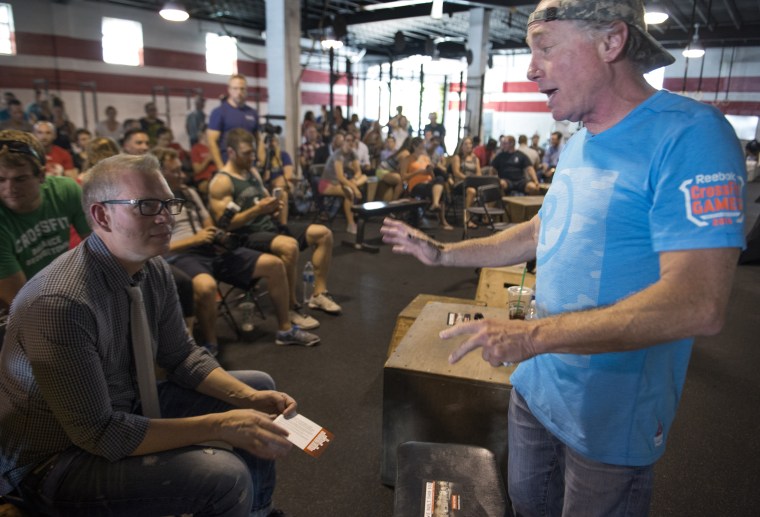Health and wellness has a racism problem and, as in many communities in which such inequities are often minimized or ignored, the movement for racial equality that has sprung up in the wake of George Floyd's killing in police custody has brought the ugliness faced by people of color to the fore.
In a recent tweet that can only be described as bizarre, CrossFit founder and CEO Greg Glassman responded to a tweet about racism's being a public health issue by calling it "FLOYD-19." Though he later referred to Floyd's death as brutal, he proceeded to use the attention and his responses to the outrage to further complain about the quarantines necessitated by the government's late, minimal response to COVID-19 and their effects on society. (An altruistic statement, I'm sure, coming from the CEO of a business that requires in-person engagement to remain a viable business.)
CrossFit is not a small movement: In over 13,000 locations globally, people come together in gyms and practice challenging daily workouts that blend powerlifting, high-intensity interval training, body weight exercises and more. At its best, it has been called competitive fitness; at its worst, it has been criticized as dangerous.
But in this moment, many are now also questioning its inclusiveness.
Gyms and health clubs are already contentious places. With the fear of being subjected to body shaming colliding with the kind of insecurity that tends to serve as either a motivation or a dismotivation to exercise, the vibe inside many gyms often contributes to what one fitness brand refers to as "gymtimidation," a general fear of working out in front of others.
With comments like Glassman's — let alone the infamous blog post by a white writer about the heavy black woman in her yoga class — one has to ask: What kind of burden is felt by Black gymgoers when you then add the fear of being in close quarters with racists? Does that take gymtimidation up a notch? How inclusive can a given gym environment be when one of its founders can so casually joke about the killing of a human being — a Black man — on social media?
Gyms are very intimate spaces. You disrobe and store your belongings in close quarters. You engage in rigorous and sometimes dangerous routines there. There is the expectation of trust among the people inside that if someone gets hurt or needs help — regardless of age, size, race, religious, sexual orientation or identity — people will not hesitate to assist. So then when Glassman's kind of racial callousness is put on display for the entire world to see, that trust is chipped away.
Black people are shown one more reason why the gym environment is an uncomfortable one.
Glassman ultimately issued an apology for his crude remarks, claiming they were "a mistake, not racist but a mistake."
I disagree wholeheartedly — and I am not alone. An onslaught of CrossFit-affiliated gyms, sponsorships and celebrity athletes have chosen to speak out or disaffiliate from the brand altogether because of Glassman's comments, choosing to support their community members in taking a stand against racism in all forms. This kind of community building and inclusion in some gyms among members is what makes it easy for so many Black people to keep coming back to some spaces — we see ourselves in the people we share space with, even when they do not share the same attributes we do. We see their grit, their determination and the way they empathize with people who are not the same as them.
The swiftness with which individual communities are taking stances against racism like Glassman's only makes them stronger, more welcoming and ultimately better.
Racism is, at its core, a system that diverts resources and benefits to one race at the expense of all others. Joking about a Black man's death as if it did not matter enough to be taken seriously — let alone joking about it in the context of COVID-19, which is three times more likely to kill Black Americans than white Americans — only furthers the casual nature with which Black lives are treated. And seeing as how people tend to care about Black lives only when their apathy or antipathy starts to affect their bottom lines, it becomes clear that the disaffiliations Glassman's company is experiencing are one kind of advocacy we definitely need most in a capitalist society. We almost certainly would not be getting his halfhearted apology if no one had protested with their feet and their wallets.
In a perfect world, going to the gym would not be so complex. You would go in, get your workout done and leave. But that world would not be "perfect," either; your money would still be going into someone's pocket and funding any of a number of things designed to hurt you outside the gym. (SoulCycle and Equinox patrons found that out the hard way last summer.)
The world is a far more complicated place, and we are all now realizing that we cannot take for granted the passive presence of solidarity in any singular community. Pretending to "not see color" is not virtuous; it is merely an excuse to ignore the ways we overlook the needs of the few to afford privileges to the many. The true "perfect world" would be one in which we take seriously an active, deliberate, top-down effort to make everyone feel welcome and safe.
And as ugly as Glassman's statements were, the response to them within the fitness community he built tells me we are finally getting closer to that ultimate goal.




